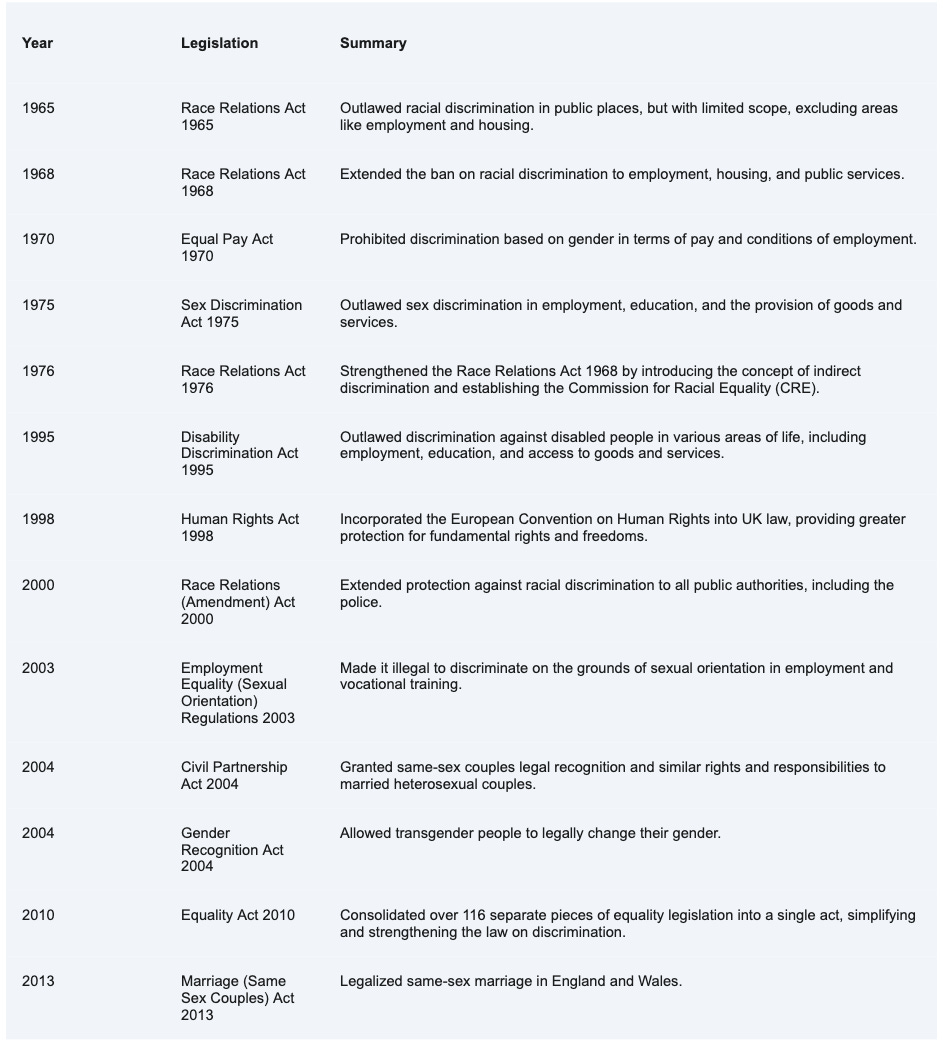🔮 Algorithming 2025
Newsletter 17
⚠️ Across 2025, I will be using the beautiful colours of the Trans and Non-Binary flag in all my cover images!
🔮 Algorithming 2025
An AI Podcast by NotebookLM (my fave AI tool)
The shit this AI makes up is astounding at times.
Spicy Vibes 🌶️
Giving you an alternative perspective
In 2024, I planned to write an article focusing on generalisable predictions for 2025. I had my playful title, which I'm keeping regardless of the topics, so with that, we are algorithmically exploring the DEI (diversity, equity and inclusion) landscape of 2025. No, it's not dead, but it certainly is being remixed—and like all remixes, sometimes the original is better (looking at you, Lady Gaga's Chromatica). However, sometimes the remix outshines in parts; I see you, Brat and "It's Completely Different but Also Still Brat" 🍏.
Prior to sharing what I am observing in corporate DEI, I would like to present a UK timeline of civil rights legislation, powered by Generative AI. I am doing this for several reasons:
Much of the corporate DEI discourse is incredibly US-centric, which obscures the reality of workforces outside the American imagination.
I exist in a UK context within a US tech landscape, so I wanted to take a moment to share some UK history (with which I have familiarity and context, as those AI models can hallucinate and seek rewards).
Yet, I will be speaking to what I know, and that is corporate happenings in the US, due to my work. I shall not offer an answer to how we have arrived at DEI remixing; there are far too many think pieces on that. Additionally, my historical and political knowledge of the landscape is nowhere near robust enough to do that topic justice.
Time to wheel it up, UK stylings!
Look at this timeline (also, if you haven't tried Google Gemini Research, I highly recommend it for topics you are familiar with).
UK Civil Rights Timeline: Legislative Changes (1950s-Present)
I have also made the timeline open source for those who might find value in this for workshop material, research or otherwise.
I wanted to create a UK timeline to paint a picture of the legislative landscape of equality and civil rights. Firstly, to appreciate the progress that has been made. Secondly, I wanted to share a cautionary warning that progress is not always linear and legislation comes, goes and gets weaponised - I see you, TERFs (trans-exclusionary radical feminists) 😒. By acknowledging the past and those who fought hard for themselves and others, we must honour their efforts and sacrifices whilst acknowledging the need to constantly reinforce and uphold their work. Far too often, we take for granted things that appear everyday and commonplace. On a bleaker note, it is important to remember that legislation as a deterrent and means for recourse doesn't necessarily change the material conditions of marginalised people directly. The Equality Act 2010 does not eradicate my harms and truly make me a fabric of the UK; nonetheless, these are what we have, and I will side-eye anyone arguing from a theoretical point of view regarding legislation.
This legislative history illustrates an important point: formal structures, whether laws or corporate initiatives, are just one piece of the equality puzzle. As we pivot from examining the UK's legal framework to today's corporate landscape, we see similar patterns emerging - where formal structures exist but their effectiveness depends heavily on implementation and genuine commitment to change.
Let's get into the meat and potatoes of what's happening in corporate DEI today.
Firstly, it is important to note that DEI exists in a collective imagination that converges and diverges from person to person. For some, it is a necessary force to create unity and connection; for others, it is a plot to divide and conquer. Either way, depending on your context, DEI is, for better or worse, poorly defined and crudely imagined! In being ill-defined and misaligned, it has become its own undoing, partly because DEI feels like an outcome or a state, rather than a doing or a practice, resulting in a function with little to no institutional power or ownership.
Disempowering
As federal offices and departments unravel and are 🚮, we are witnessing many organisations reduce the scope and remit of DEI initiatives. Rather than wholesale removal of their departments, they will start to be diffused into other areas of the business, or their roles reimagined in ways that start to feel like 'All Lives Matter'—shorthand for 'we must appeal to our vocal opponents'. In doing so, teams will have their work dictated and scrutinised within an inch of its life, with all identity-based programming scrapped for initiatives that will entrench further biases into processes under the guise of fairness (aka shorthand for merit, aka mediocre people complaining).
Additionally, data is now going to be irrelevant as we enter the feels era. The feels era is all about the perception of marginalised groups getting too much, all because of... equity. Equity, I believe, has been one of the greatest awakenings and undoings in corporate DEI. It gave rise to the notion of power imbalances and concepts such as headwinds and tailwinds. However, in doing so, it emboldened the notion of merit and essentially 'dog eat dog'. Maybe Black folks are just stupid, lazy and inferior?! 🤷🏿♂️ In the end, equity lost and merit won, and along with DEI departments, those less empowered will be further marginalised, excluded and, in worst cases, socially eradicated from existence.
Dismantling
I have to be honest; this is very much the trajectory of most DEI departments - the complete dismantling of DEI offices and teams. Gone. The easiest way for most organisations in the US to kiss the ring is to just get rid of their DEI function and throw them under the bus as to why their organisation couldn't hire fast enough, innovate better, or have a greater market share. That tiny, understaffed function which owns zero processes (because WTF is a DEI process? It does not exist) and had no institutional power has somehow managed to hold back an entire organisation.
I would love to imagine DEI functions as deeply Machiavellian actors who really mucked things up, but the data doesn't lie. Very few organisations actually made diversity gains across the board, and most struggled to attract and retain talent from marginalised groups. Very few organisations even deem it necessary to have a DEI practitioner in the C-Suite (I see you, HR). As we consider the reality over a TikTokified version of corporate America, DEI teams had no power, and any institutional influence they possessed was systematically dismantled at every turn. From rescinding initiatives and quietly removing public commitments to reducing DEI departments' budgets, the erosion was constant until nothing remained.
So, in 2025, get used to the DEI team being dismantled brick by brick or by a demolition crew; either way, say goodbye to your colleagues. In my most cynical state, I would say the DEI theatre is being packed up and put in a warehouse somewhere.
Destabilise
We have hit the third D in this trifecta of uncanny terms which feels like a rallying call for social justice; however, they are functions and tools weaponised by the right. It feels somewhat ironic, but this is the sorry state of affairs of DEI in 2025. If it is not disempowered or dismantled, DEI will certainly be destabilised and muted until it is a mere echo of yesterday. I see DEI destabilisation as a unique philosophical discourse, materialising as open-ended questions that seek to question the validity and purpose of DEI. An example of this destabilisation is the notion that DEI is political and has no space in the workplace, or why can't all views be expressed freely in the workplace (the feeling of being silenced), etc. Such talking points are made with little to no backbone but rather to erode the necessity of DEI. The goal is to constantly question why DEI is necessary, usually with an ambition to prove that DEI is not about unity but rather it is a ruinous practice that divides people and sows the seeds of a fractured society.
Sadly, we are far from the end of circular arguments and paper-thin talking points; this is just the beginning. As DEI becomes destabilised within corporations, we will end up in a vicious cycle of contempt, complaint, litigation, legislative removal (Project 2025) - leaving many in the US with no protections whatsoever in even the most innocuous parts of civic life. The irony here is we are not merely witnessing a destabilisation of DEI; we are witnessing the reimagining of what it means to be American. And, sadly, this is moving closer to the vision depicted by Octavia Butler's Parable of the Sower, where she predicted a megalomaniac president destroying the US with the slogan 'Make America Great Again'.
Overall, it is looking bleak for corporate DEI in the US. What is even scarier is that what is happening to DEI is merely a dress rehearsal for what is actually to come as the US braces for a turbulent future. However, as I centre myself and practise hope and community - I see an opportunity for corporate DEI, and if done well, I see DEI, It's Completely Different but Also Still DEI!
Stay tuned for next week's Remixing 2025 🍏
🔊 Spread the word
So, with all your newly acquired knowledge, how about taking me for an outing on LinkedIn or stunting on a colleague? Also, don’t forget, likes are free, so press my buttons…
Charting
by Jai Clarke-Binns




